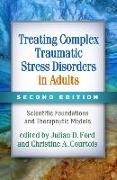Read more
This authoritative reference on complex traumatic stress disorders (CTSDs) and their assessment and treatment has now been significantly revised with more than 75% new material reflecting a decade of advances in the field.
List of contents
Foreword, Judith Lewis Herman
I. Overview
1. Defining and Understanding Complex Trauma and Complex Traumatic Stress Disorders, Julian D. Ford & Christine A. Courtois
2. Developmental Neurobiology, Julian D. Ford
3. Best Practices in Psychotherapy for Adults, Christine A. Courtois, Julian D. Ford, Marylene Cloitre, & Ulrich Schnyder
4. Therapeutic Alliance and Risk Management, Christine A. Courtois
5. Evidence-Based Psychological Assessment of the Sequelae of Complex Trauma, Joseph Spinazzola & John Briere
6. Assessing and Treating Complex Dissociative Disorders, Kathy Steele & Onno van der Hart
7. Cultural Humility and Spiritual Awareness, Laura S. Brown
8. New Perspectives on Vicarious Traumatization and Complex Trauma, Laurie Anne Pearlman, James Caringi, & Ashley R. Trautman
II. Evidence-Supported Individual Treatment Modalities and Models
9. Prolonged Exposure Therapy, Elizabeth Hembree & Edna B. Foa
10. Cognitive Therapy, Anke Ehlers & Hannah Murray
11. Cognitive Processing Therapy, Kathleen M. Chard, Ellen T. Healy, & Colleen E. Martin
12. Brief Eclectic Psychotherapy, Berthold Gersons, Mirjam J. Nijdam, Geert E. Smid, & Ulrich Schnyder
13. Eye Movement Desensitization and Reprocessing Therapy, Deborah L. Korn & Francine Shapiro
14. Narrative Exposure Therapy, Maggie Schauer, Katy Robjant, Thomas Elbert, & Frank Neuner
15. Emotion-Focused Therapy, Sandra C. Paivio & Lynne E. Angus
16. Interpersonal Psychotherapy, Ari Lowell, Andrea Lopez-Yianilos, & John C. Markowitz
17. Cognitive-Behavioral Therapy, Christie Jackson, Kore Nissenson, & Marylene Cloitre
18. Trauma Affect Regulation: Guide for Education and Therapy, Julian D. Ford
III. Group/Conjoint Therapy Models
19. Group Therapy, Julian D. Ford
20. Dual-Trauma Attachment-Based Couple Therapy, Pamela C. Alexander
21. Family Systems Therapy, Julian D. Ford
22. Complex Trauma and Addiction Treatment, Denise Hien, Lisa Caren Litt, Teresa López-Castro, & Lesia M. Ruglass
IV. Emerging Psychotherapy Models
23. Sensorimotor Psychotherapy, Pat Ogden
24. Experiential Approaches, Janina Fisher
25. Mindfulness Approaches, Barbara L. Niles, Sarah Krill Williston, & DeAnna L. Mori
26. Complementary Healing Therapies, Stefanie F. Smith & Julian D. Ford
Epilogue: Overview and Future Directions in Treatment for Complex Traumatic Stress Disorders, Julian D. Ford & Christine A. Courtois
Afterword, Bessel A. van der Kolk
Author Index
Subject Index
About the author
Julian D. Ford, PhD, ABPP, a clinical psychologist, is Professor of Psychiatry at the University of Connecticut School of Medicine, where he is Director of the Center for Trauma Recovery and Juvenile Justice and the Center for the Treatment of Developmental Trauma Disorders. He has served as President of the International Society for Traumatic Stress Studies, is a Fellow of the American Psychological Association, and is Associate Editor of the
Journal of Trauma and Dissociation and
European Journal of Psychotraumatology. Dr. Ford has published more than 250 articles and book chapters. He is coeditor of
Treating Complex Traumatic Stress Disorders in Adults, Second Edition, and
Treating Complex Traumatic Stress Disorders in Children and Adolescents, and coauthor of
Treatment of Complex Trauma: A Sequenced, Relationship-Based Approach. His research focuses on developmental trauma disorder and the Trauma Affect Regulation: Guide for Education and Therapy (TARGET) therapeutic intervention.
Christine A. Courtois, PhD, ABPP, a counseling psychologist, is retired from clinical practice and now serves as a consultant/trainer on trauma psychology and treatment. She is a Fellow of the American Psychological Association (APA) and the International Society for the Study of Trauma and Dissociation. Dr. Courtois is a past president of APA Division 56 (Trauma Psychology) and served as Chair of the APA's Clinical Practice Guideline for the Treatment of Posttraumatic Stress Disorder in Adults. She has received the Award for Distinguished Contributions to Independent Practice from the APA, the Sarah Haley Award for Clinical Excellence from the International Society for Traumatic Stress Studies, the Award for Distinguished Service and Contributions to the Profession of Psychology from the American Board of Professional Psychology, and the APA Division 56 Lifetime Achievement Award. She is coeditor of
Treating Complex Traumatic Stress Disorders in Adults, Second Edition, and
Treating Complex Traumatic Stress Disorders in Children and Adolescents, and coauthor of
Treatment of Complex Trauma: A Sequenced, Relationship-Based Approach.

